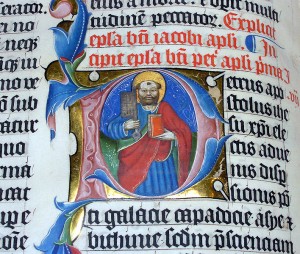 Part Four, The Church’s Memory and Identity Continued:
Part Four, The Church’s Memory and Identity Continued:
In the previous installments of this series (part one, part two, part three), I discussed the role of various influential theologians and laymen who effectively acted as “interpreters” of Vatican II. Their actions, I argued, led to a lot of confusion about what the Council taught and expected of Catholics. In this installment, I would like to wrap up this discussion.
Prior to the Second Vatican Council, the faithful (especially the clergy) were more easily disposed to the larger culture and tradition espoused by the Latin language.[i] The continuity between the present and the world of antiquity was maintained and this provided a unique door which people could walk through and experience an entire life and culture. Dropping the language effectively shut that door and it has subsequently become difficult to re-open, leaving many Catholics at a handicap on how to properly conduct themselves in the Household of God that is the Church.[ii]
The Church’s memory and identity has become jeopardized and it needs to be reclaimed. An important — and I believe critical — way we should do this is by restoring Latin in the Liturgy, primarily in the Western world. Vatican II indicated that Latin should be maintained in the Ordinary of the Mass (Sacrosanctum Concilium 54). I am also aware that restoring Latin creates a pastoral issue. Most Catholics today do not understand Latin. If Latin is to be restored, the opportunity to understand it must also be afforded the faithful. An effective way to do this is for Catholic schools to offer the study of Latin to their students once more. For adults, parishes would do well to offer appropriate catechetical programs or projects for parishioners even if only to understand basic liturgical Latin. This is hard work, but I think the Catholic priest and blogger Fr. John Zuhlsdorf has it right when he says, “brick by brick.”
If Catholics continue to remain in ignorance of their history and identity, there will be serious repercussions. One such repercussion concerns how effective our evangelization will be. A primary objective of Vatican II was for the Church to dialogue with the contemporary world. How is this possible when Catholics suffer from such ignorance of their Faith? In bringing herself to the forum of discussion, the Church must have something to contribute. She brings herself in all her glory and it is impossible to exclude her Latin patrimony. To attempt otherwise is to dance with the devil.
Without her memory and identity, the Church runs a serious risk of falling into all sorts of reinventions and profane novelties. This is something the Church cannot risk. Souls are at stake and saving them is the Church’s primary mission. Forming them for eternal life with Christ in heaven is the top priority and the Latin tradition served as an excellent means for this end. Its large-scale removal has been a contributing factor to the malformation of the faithful, which, in turn, creates questions pertaining to their salvation.
The above does not mean “turning back the clock” and forgetting Vatican II. Rather, we might want to consider Pope Benedict XVI’s “hermeneutic of reform” as the best way to look at the situation.[iii] This approach safeguards the unity of the Church, the formation and salvation of souls as well as the legitimate work of the Council. We must also pay attention to the Magisterium and its interpretation of the Council. This is, in essence, nothing but a simple doing and reiteration of traditional Latin theology and one that will greatly assist us in re-orienting ourselves to the life, culture and history of Holy Mother Church.
ENDNOTES:
[i] This manifested itself especially through the liturgical rites and feasts of the Church.
[ii] C.f. 1 Timothy 3:15. Greek text.
[iii] http://www.vatican.va/holy_father/benedict_xvi/speeches/2005/december/documents/hf_ben_xvi_spe_20051222_roman-curia_en.html (Accessed September 3, 2009).
(© 2011 Kevin Symonds)



